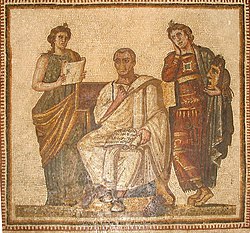Augustan literature is the period of Latin literature written during the reign of Augustus (27 BC–AD 14), the first Roman emperor.[1]
In literary histories of the first part of the 20th century and earlier, Augustan literature was regarded along with that of the Late Republic as constituting the Golden Age of Latin literature, a period of stylistic classicism.
Most of the literature periodized as Augustan was in fact written by men —
Virgilio,
Orazio
Properzio
Tito Livio —
whose careers were established during the triumviral years, before Octavian assumed the title Augustus.
Strictly speaking, Ovidio is the poet whose work is most thoroughly embedded in the Augustan regime.
Augustan literature produced the most widely read, influential, and enduring of Rome’s poets.
The Republican poets Catullo and Lucrezio are their immediate predecessor.
Although Vergil has sometimes been considered a “court poet,” his ENEIDE, the most important of the Latin epics, also permits complex readings on the source and meaning of Rome’s power and the responsibilities of a good leader.
Ovid’s works were wildly popular, but the poet was exiled by Augustus in one of literary history’s great mysteries.
Carmen et error (“a poem” or “poetry” and “a mistake”) is Ovid’s own oblique explanation.
Among prose works, the monumental history of Livio is preeminent for both its scope and stylistic achievement. T
Questions pertaining to tone, or the writer's attitude toward his subject matter, are acute among the preoccupations of scholars who study the period.
In particular, Augustan works are analyzed in an effort to understand the extent to which they advance, support, criticize or undermine social and political attitudes promulgated by the regime, official forms of which were often expressed in aesthetic media.
List of Augustan writers
VIRGILIO
Publius Vergilius Maro (Virgil, spelled also as Vergil) (70 – 19 BC),
ORAZIO
Quintus Horatius Flaccus (Horace) (65 – 8 BC), known for lyric poetry and satires
PROPERZIO
- Sextus Aurelius Propertius (50 – 15 BC), poet
TIBULLO
- Albius Tibullus (54 – 19 BC), elegiac poet
- Titus Livius (Livy) (64 BC – 12 AD), historian
OVIDIO
Publius Ovidius Naso (Ovid) (43 BC – 18 AD), poet
Grattius Faliscus (a contemporary of Ovid), poet
Marcus Manilius (1st century BC & AD), astrologer, poet
Gaius Julius Hyginus (64 BC – 17 AD), librarian, poet, mythographer
Marcus Verrius Flaccus (55 BC – 20 AD), grammarian, philologist, calendrist
Marcus Vitruvio Pollione (80 70 BC – after 15 BC), engineer, architect
Marcus Antistius Labeo (d. 10 or 11 AD), jurist, philologist
Lucius Cestius Pius (1st century BC & AD), Latin educator
Gnaeus Pompeius Trogus (1st century BC), historian, naturalist
Marcus Porcius Latro (1st century BC), rhetorician
Gaius Valgius Rufus (consul 12 BC), poet.
References
Julius Caesar held the office of dictator in perpetuity; technically, the constitution of the Roman Republic was still in effect during Caesar's relatively short time in power.
His heir Augustus styled himself princeps, or "Leading Citizen," but is considered the first of the Imperial monarchs and reigned for more than 40 years.
See Roman Emperor (Principate).
- Jump up ^ Fergus Millar, "Ovid and the Domus Augusta: Rome Seen from Tomoi," Journal of Roman Studies 83 (1993), p. 6.
- Jump up ^ Fergus Millar, "Ovid and the Domus Augusta: Rome Seen from Tomoi," Journal of Roman Studies 83 (1993), p. 6.
- Jump up ^ Joseph Farrell, “The Augustan Period: 40 BC–AD 14,” in A Companion to Latin Literature (Blackwell, 2005), pp. 44–57.
- Jump up ^ Joseph Farrell, “The Augustan Period: 40 BC–AD 14,” in A Companion to Latin Literature (Blackwell, 2005), pp. 44–57.
- Jump up ^ Christopher Pelling, "The Triumviral Period," in The Cambridge Ancient History: The Augustan Empire, 43 B.C.–A.D. 69 (Cambridge University Press, 1996), p. 73 online. See also Farrell, "The Augustan Period."






No comments:
Post a Comment